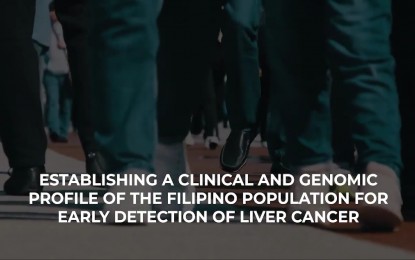Health
Recruitment for liver cancer detection study nears completion

MANILA – The recruitment of 800 patients for a study on early detection of liver cancer among Filipinos with chronic hepatitis B is nearing completion, Department of Science Secretary Fortunato de la Peña announced Friday.
In a taped report aired in the afternoon, he said the researchers are establishing a clinical and genomic profile of the Filipino population for early detection of liver cancer.
This study by the University of the Philippines Manila (UPM) seeks to develop an artificial intelligence (AI)-driven detection system for the early diagnosis of liver cancer among Filipinos with chronic hepatitis B.
“Recognizing that cancer remains a national health priority in the Philippines with significant implications worldwide and that cancer is the third leading cause of morbidity and mortality in the country, the DOST, through the Philippine Council for Health Research and Development (PCHRD) is continuously investing on cancer research,” De la Peña said, adding that the PCHRD is supporting the study.
The recruitment of study participants was made possible through the help of partner hospitals across the country. The whole-genome genotyping of patient samples will commence at the Philippine Genome Center, while phenotypic evaluation, such as biomarker assay and ultrasound imaging, is ongoing, according to De la Peña.
The DOST chief said an effective and comprehensive way to study liver cancer is through a multi-omics approach, which he said is also a reliable tool to diagnose a patient’s prognosis.
“Multi-omics approaches are novel frameworks that integrate multiple omics datasets generated from the same patients to better understand the molecular and clinical features of cancers, which could lead to the discovery of clinically relevant biomarkers that can either be used for early diagnosis, prediction of treatment response. This could also determine the possible course of the disease, or serve as novel targets for therapies,” he said.
De la Peña pointed out that since this cancer is linked to the hepatitis B virus, one option for primary prevention is through vaccination. “This, however, does not apply to patients who already have the disease. It is then important to do secondary prevention or screening that can detect different cancer stages, hence appropriate medical intervention can be provided,” he noted.
The Philippines is not yet fully-equipped with evidence to make liver cancer screening integral in the healthcare system, he added.
“With this study, a clinically-useful scoring system for liver cancer diagnosis can be produced, which will be used by clinicians. They will benefit from having a reliable scoring system that will enable them to decide on how often diagnostic tests should be done, maximizing the use of the limited funds of patients while maintaining a good clinical practice,” De la Peña said.
The DOST sees that generation omics data among Filipinos will boost medical research for a more comprehensive understanding of the nature and mechanism of liver cancer.





















